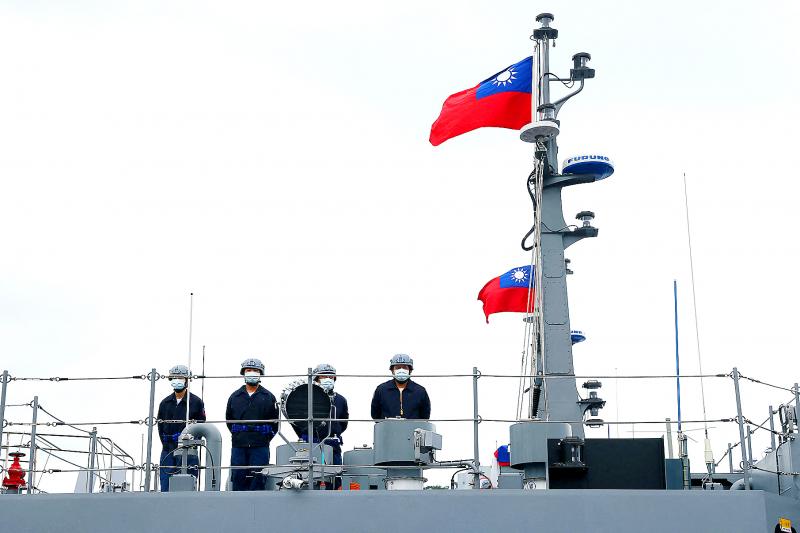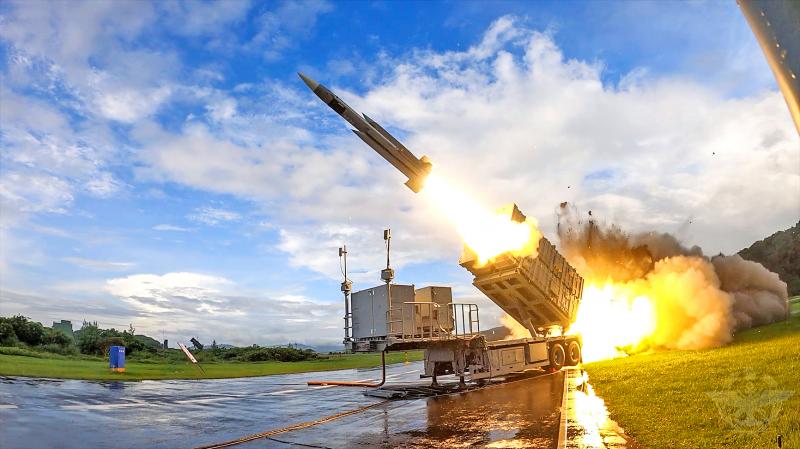On Taiwan’s tiny Penghu islands, the missile bases that sit next to white-sand beaches and bustling fish markets are a visceral reminder of the constant threat of attack from China.
Despite the huge military discrepancy between the two sides, many analysts believe that Taiwan’s location, inhospitable terrain and US support would make a full-scale invasion extremely difficult for China — and possibly too costly to countenance.
Recent record incursions of Chinese fighter jets into Taiwan’s air defense identification zone and increasingly aggressive rhetoric from the administration of Chinese President Xi Jinping (習近平) have raised fears that China might contemplate acting on a pledge to “reunify” Taiwan sooner rather than later.

Photo: Ann Wang/Reuters
The Chinese Ministry of National Defense last week said it would “not hesitate to start a war” to “stop Taiwan from becoming independent.”
One US admiral said an attack could come by 2027, the centenary of China’s People’s Liberation Army (PLA).
“If we were to go head to head militarily, we don’t stand a single chance,” said retired admiral Lee Hsi-min (李喜明), who was head of Taiwan’s armed forces until 2019.

Photo: EPA-EFE
However, Russia’s failure to quickly overrun Ukraine stands as a cautionary tale for Beijing, while simultaneously providing Taipei with tactical blueprints and inspiration on how to hold off a much larger enemy.
“Our soldiers here are all Taiwanese and will be fighting to defend their homeland,” said Chen Ing-jin, a Penghu historian and architect. “That makes a difference. Just look at Ukraine.”
Taiwan’s biggest advantage is its geography.
Amphibious assaults are exceedingly difficult, and if China were to invade Taiwan — and, crucially, hold it — Beijing would need to move hundreds of thousands of troops, along with equipment, across the Taiwan Strait.
Even at its narrowest point, the strait is 130km and weather conditions are notoriously unforgiving, especially during two monsoon seasons. That leaves just two brief “windows of attack” — May to July and October — for such a large-scale operation, a US Naval War College report said.
In addition, studded into the waters are outlying islands like the Penghu chain — bristling with radar and missiles pointing out into the strait. With the likely early warning and the weaponry Taipei has at its disposal, the PLA would probably incur high losses in that first stage of transit, said James Char, associate research fellow at Singapore’s S. Rajaratnam School of International Studies.
While the small, flat outlying islands might in the end prove easy for Beijing to subdue, on Taiwan’s main island, the opposite applies.
The coastal terrain “is a defender’s dream come true,” said Ian Easton, author of The Chinese Invasion Threat.
He and his colleagues estimate that Taiwan only has 14 small beaches suitable for landing, and they are bordered by mountains, cliffs or dense urban infrastructure.
“Landing on Taiwan is only part of the problem,” said Bonny Lin (林洋), director of the China Power Project at the Center for Strategic and International Studies.
Progress through Taiwan’s wetlands, mountains and densely populated urban areas would require a huge range of combat skills and weapons.
“How is it going to sustain those forces once they’re in position and advancing?” Lin asked. “How is it going to do the logistics?”
China has spent the equivalent of hundreds of billions of US dollars upgrading its military capabilities over the past decade, and its statistical dominance over Taiwan is enormous.
The PLA has more than 1 million ground force personnel to Taiwan’s 88,000; 6,300 tanks compared with 800; and 1,600 fighter jets to 400, US Department of Defense data show.
Washington also estimates that Beijing has the world’s largest navy by ship number. A recent US Naval War College paper described those ships as “increasingly sophisticated, capable vessels.”
However, many experts, including Char and Lin, question whether they are yet capable enough.
Atlantic Council senior adviser Harlan Ullman put it more forcefully in a February paper: “China simply lacks the military capability and capacity to launch a full-scale amphibious invasion of Taiwan for the foreseeable future.”
In the meantime, Taiwan has plans to counter China’s might in numbers, with Lee highlighting asymmetric warfare — an emphasis on mobility and precision attacks — an approach US officials are reportedly encouraging. Lee pointed to the success of the Ukrainian mobile missile launcher that sank Russia’s Black Sea flagship, the Moskva.
Taiwan has built up stockpiles of mobile missile batteries and shoulder-launched weapons, but he said they need substantially more.
The factor that preoccupies Beijing most is who else might get involved in the conflict, Chinese military expert Song Zhongping (宋忠平) said.
“The difficulty of liberating Taiwan lies in the potential intervention of the United States. It’s the biggest obstacle for the PLA to clear,” he said.
The US officially maintains a policy of “strategic ambiguity” on whether it would intervene militarily in the event of an invasion. Regardless, it supplies Taiwan with military hardware, while US President Joe Biden has said multiple times that Washington would intervene.
The “extent, depth and breadth” of US and other allies’ involvement would greatly determine how any conflict would play out, Song said.
Even without a military intervention, Char said the threat of economic sanctions, such as those placed on Russia, would give Chinese leadership pause for thought.
Whether China would be prepared to cause mass casualties with an invasion, while risking its domestic and international image, is a fundamental question.
“You need to let China know that it will suffer tremendous losses, and even then it may still not be able to occupy Taiwan,” Lee said. “So that China will think that the best way to resolve the Taiwan problem is by peaceful means.”

SHIPS, TRAINS AND AUTOMOBILES: The ministry has announced changes to varied transportation industries taking effect soon, with a number of effects for passengers Beginning next month, the post office is canceling signature upon delivery and written inquiry services for international registered small packets in accordance with the new policy of the Universal Postal Union, the Ministry of Transportation and Communications said yesterday. The new policy does not apply to packets that are to be delivered to China, the ministry said. Senders of international registered small packets would receive a NT$10 rebate on postage if the packets are sent from Jan. 1 to March 31, it added. The ministry said that three other policies are also scheduled to take effect next month. International cruise ship operators

NUMBERS IMBALANCE: More than 4 million Taiwanese have visited China this year, while only about half a million Chinese have visited here Beijing has yet to respond to Taiwan’s requests for negotiation over matters related to the recovery of cross-strait tourism, the Tourism Administration said yesterday. Taiwan’s tourism authority issued the statement after Chinese-language daily the China Times reported yesterday that the government’s policy of banning group tours to China does not stop Taiwanese from visiting the country. As of October, more than 4.2 million had traveled to China this year, exceeding last year. Beijing estimated the number of Taiwanese tourists in China could reach 4.5 million this year. By contrast, only 500,000 Chinese tourists are expected in Taiwan, the report said. The report

The Forestry and Nature Conservation Agency yesterday launched a gift box to market honey “certified by a Formosan black bear” in appreciation of a beekeeper’s amicable interaction with a honey-thieving bear. Beekeeper Chih Ming-chen (池明鎮) in January inspected his bee farm in Hualien County’s Jhuosi Township (卓溪) and found that more than 20 beehives had been destroyed and many hives were eaten, with bear droppings and paw prints near the destroyed hives, the agency said. Chih returned to the farm to move the remaining beehives away that evening when he encountered a Formosan black bear only 20m away, the agency said. The bear

HORROR STORIES: One victim recounted not realizing they had been stabbed and seeing people bleeding, while another recalled breaking down in tears after fleeing A man on Friday died after he tried to fight the knife-wielding suspect who went on a stabbing spree near two of Taipei’s busiest metro stations, Taipei Mayor Chiang Wan-an (蔣萬安) said. The 57-year-old man, identified by his family name, Yu (余), encountered the suspect at Exit M7 of Taipei Main Station and immediately tried to stop him, but was fatally wounded and later died, Chiang said, calling the incident “heartbreaking.” Yu’s family would receive at least NT$5 million (US$158,584) in compensation through the Taipei Rapid Transit Corp’s (TRTC) insurance coverage, he said after convening an emergency security response meeting yesterday morning. National